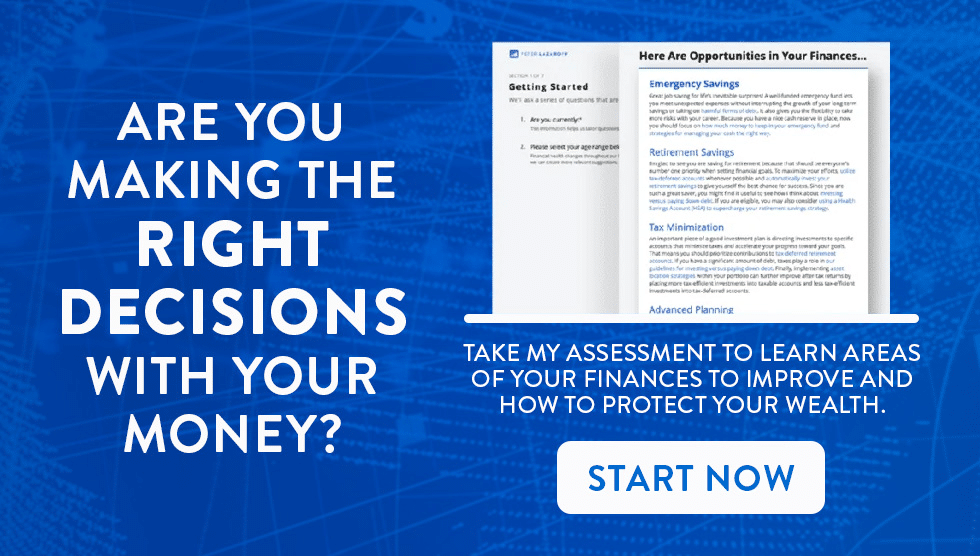Retail investors are often curious about various aspects of AI, especially regarding its potential impact on the financial markets and investment opportunities. Some common questions asked by retail investors about AI include:
Listen now and learn:
- Whether you’re investing in companies at the forefront of AI
- Questions to ask about your existing holdings
- How AI can and can’t be incorporated into portfolio construction
Listen Now
Show Notes
Welcome to the Long-Term Investor.
Individual investors are increasingly curious about various aspects of AI, especially regarding its potential impact on the financial markets and investment opportunities.
In this episode, I’m going to briefly answer the two most common questions I’m hearing from clients, family, and friends:
1. Are you investing in companies that are at the forefront of AI?
2. Are you incorporating AI in portfolio construction?
As a reminder, this podcast is meant for educational purposes only and is not investment advice. There is a full disclaimer at the end of each episode, but I wanted to emphasize that point at the beginning because I’m going to be naming specific companies to help answer these common questions.
While you’re here, be sure to subscribe to my newsletter or schedule a call to learn how we help successful individuals around the country reduce their tax bill, proactively manage cash flow, and make prudent investment decisions.
Now, let’s tackle that first question.
Are You Investing in Companies That Are at the Forefront of AI?
At a high level, there is no single “AI Industry.” It is not as if we can run a report to detail our exposure to “AI Companies.”
The Global Industry Classification Standard (GICS) systematically identifies every company by sector (11), industry group (24), industry (69), and sub-industry (158)…so if you want to run a report knowing how much exposure you have to any of those particular segments, it can be done.
But there isn’t an AI sector, industry group, industry, or sub-industry. So instead, here are three different questions that maybe help answer the original question:
1. Are you investing in the chip producers that are leading the way in AI?
This one will be different from portfolio to portfolio. The fact of the matter is that it has tended to be larger chip producers that have heavily invested in producing chips/semiconductors that have so far powered AI and machine learning.
In the U.S., the largest name that has constantly been mentioned on the chip side is Nvidia. This is a large-cap stock that is held in many passive or rules-based US core strategies with large-cap exposure.
Broad international index funds or rules-based core strategies have exposure to some of the larger chip producers in the international markets. These would be companies such as STMicroelectronics or Infineon Technologies.
For emerging market strategies, you’ll often see exposure to Taiwan Semiconductor, which is one of the largest chip producers in the world.
2. Are you investing in companies that are leading the way in creating AI products such as ChatGPT?
The company that brought AI to the attention of most investors is OpenAI, the creator of ChatGPT. OpenAI is not a publicly traded company, so you won’t directly own it in any sort of ETF or mutual fund.
OpenAI was originally launched as a non-profit organization, but now has a for-profit arm that caps the profits it can earn. Several large firms have invested in this for-profit arm of OpenAI, most notably Microsoft which initially invested $1 billion in OpenAI in 2019 and increased their investment at the start of 2023.
So while you can’t have a direct OpenAI investment, anyone with a passive total US market or US large-cap position as well as many people with broadly diversified, rules-based US core strategies will have exposure to Microsoft.
It’s possible you have exposure to other companies that have invested in OpenAI or other AI companies under similar circumstances that haven’t been publicly disclosed yet.
Beyond this exposure, many of the major tech companies in the US such as Alphabet, Microsoft, IBM, etc have been heavily investing AI for years. In international markets, SAP (a German multinational software company) has been recognized as a leader in AI for SaaS (or software-as-a-service).
This is not to say that these are the only companies making investments in AI, but they are good examples of some of the larger ones that most globally diversified investors have exposure to.
3. Are the companies you are invested in incorporating AI into their business?
Many different companies have been using AI in their business for a long time. Everything from automated call centers, fraud detection in credit cards, and self-driving cars, to healthcare. There is probably no single sector that will not be disrupted by AI in some regard.
Amazon is an obvious example with its digital voice assistant, Alexa, but AI is ingrained in many aspects of its business. Amazon uses AI to collect data about your buying habits and personal life so that it’s able to predict that you’ll need it before you even recognize it. Not only does this allow them to recommend those items at just the right time, but it allows them to move inventory around the country in a manner that shrinks the shipping time and costs required to deliver things in one or two days.
AI also powers the new convenience store concept called Amazon Go. Depending on where you live, it’s possible that you aren’t familiar with these brick-and-mortar offerings—I’ve only seen the technology at sporting venues in St. Louis, but I’ve seen full stores using the technology in New York City and San Francisco. Basically, the stores have AI track what items you pick up and then automatically charge you for those items without any need to check out.
Another obvious example is Apple, which introduced Siri in 2011. Today, so many of the features and conveniences an iPhone provides every day is the result of AI realizing where you are, what’s going around you, and what you are looking for, thereby supporting you to save time and relieve stress. To me, this might actually be the best example of how prevalent AI is in our everyday lives.
The examples go on and on if you dig into IBM, Google, Facebook, etc. It goes well beyond big tech, too. Healthcare, financial services, industrials, basically everyone has been investing in AI and machine learning for a long time now,
How Are You Incorporating AI into Your Portfolio Construction?
One thing that may surprise you is that I’m not particularly worried about AI putting us out of business. I spoke at length about this with industry-thought leader Michael Kitces in Episode 102, an episode that is an absolute master class on the evolution of financial advice.
AI today is mostly a really cool calculator. It can’t discover the problem for you, you have to figure out what to ask it.
From a financial planning perspective, most people have trouble identifying the real problems and pain points of their financial lives. We uncover them ourselves through multiple conversations over the course of days, weeks, or even months. AI isn’t a tool to help you figure that out. But advisors can use AI as a tool—and already do in some respects—to be more efficient in much of the work they do to assist clients.
From a portfolio construction perspective, there are things AI can and can’t do.
AI can be utilized in investment strategies by analyzing vast amounts of data and identifying patterns and trends that may not be easily recognizable to humans. AI algorithms can process information from various sources such as financial statements, news articles, social media sentiment, and market data to generate investment insights and recommendations.
But while AI algorithms can analyze historical data and identify patterns, it is important to note that predicting market trends and providing accurate forecasts is challenging. Financial markets are complex adaptive systems that are influenced by numerous factors, including economic conditions, geopolitical events, and human behavior, making it difficult to accurately predict future outcomes. AI can enhance analysis and decision-making processes, but it is not foolproof.
The whole market behaves like a big neural network compiling different pieces of the information stream to come to a continuously evolving price reflecting the most current events and consensuses.
Having an AI algorithm to attempt to outsmart the market price does not seem to be a promising enterprise. Given that the market is an AI-like process, using that market price together with company financials is a way to create higher expected returns portfolios, which is something we do in a number of our portfolio strategies.
That is not to say that AI does not play a role in portfolio construction, but it’s more likely to be relevant in data cleaning for financials or automating reconciliation, which can reduce costs and increase accuracy.
Resources:
- EP. 102 – AI And The Evolution Of Financial Advice With Michael Kitces
- EP. 70 – Thinking Of Markets Like Piles Of Sand
- EP. 72 – The Collective Wisdom Of Financial Markets
Submit Your Question For the Podcast
Do you have a financial or investing question you want answered? Submit your question through the “Ask Me Anything” form at the bottom of my podcast page.
If you enjoy the show, you can subscribe wherever you listen to podcasts, and please leave me a review. I read every single one and appreciate you taking the time to let me know what you think.
About the Podcast

Long-term investing made simple. Most people enter the markets without understanding how to grow their wealth over the long term or clearly hit their financial goals. The Long Term Investor shows you how to proactively minimize taxes, hedge against rising inflation, and ride the waves of volatility with confidence.
Hosted by the advisor, Chief Investment Officer of Plancorp, and author of “Making Money Simple,” Peter Lazaroff shares practical advice on how to make smart investment decisions your future self with thank you for. A go-to source for top media outlets like CNBC, the Wall Street Journal, and CNN Money, Peter unpacks the clear, strategic, and calculated approach he uses to decisively manage over 5.5 billion in investments for clients at Plancorp.
Support the Show
Thank you for being a listener to The Long Term Investor Podcast. If you’d like to help spread the word and help other listeners find the show, please click here to leave a review.
Free Financial Assessment
Do you want to make smart decisions with your money? Discover your biggest opportunities in just a few questions with my Financial Wellness Assessment.

















